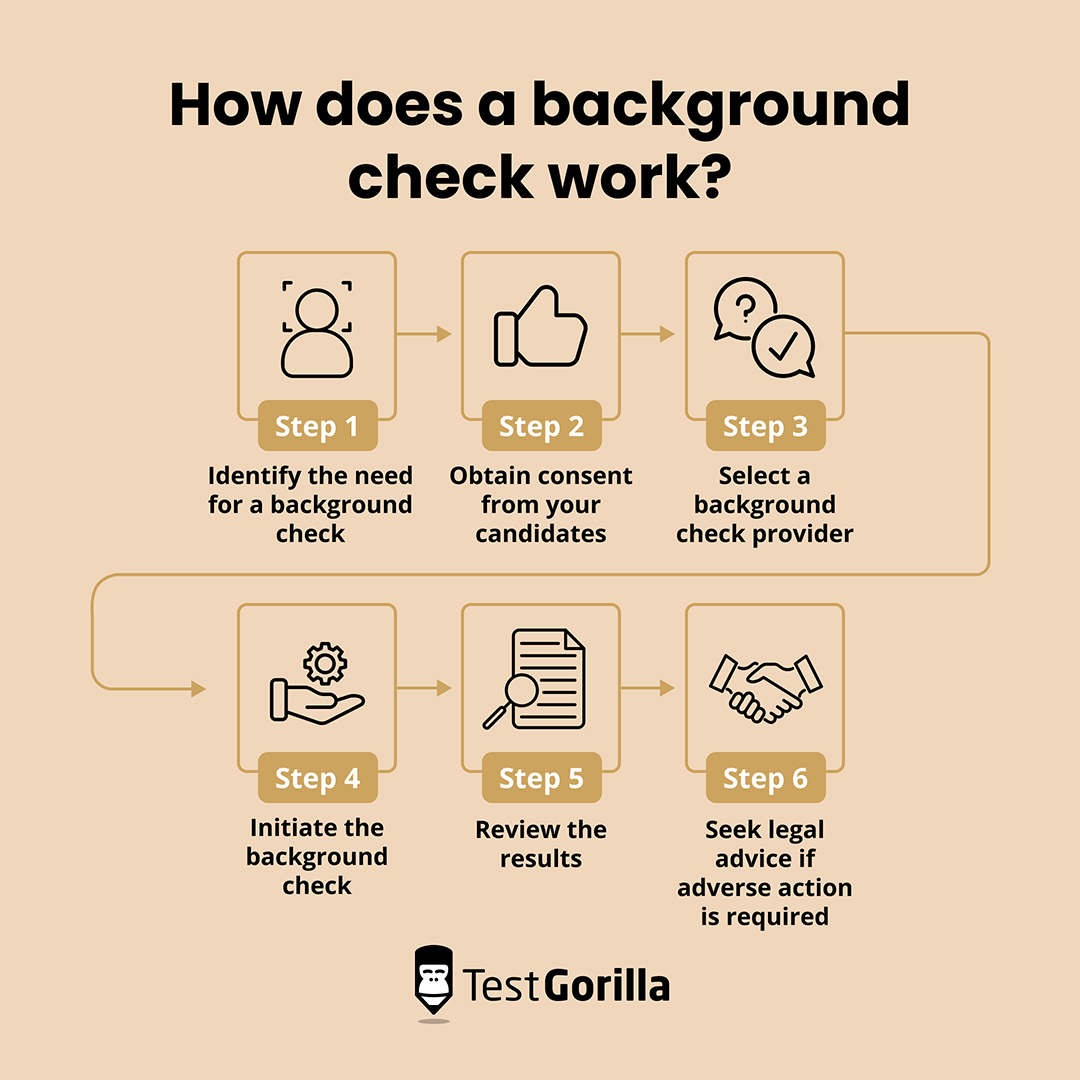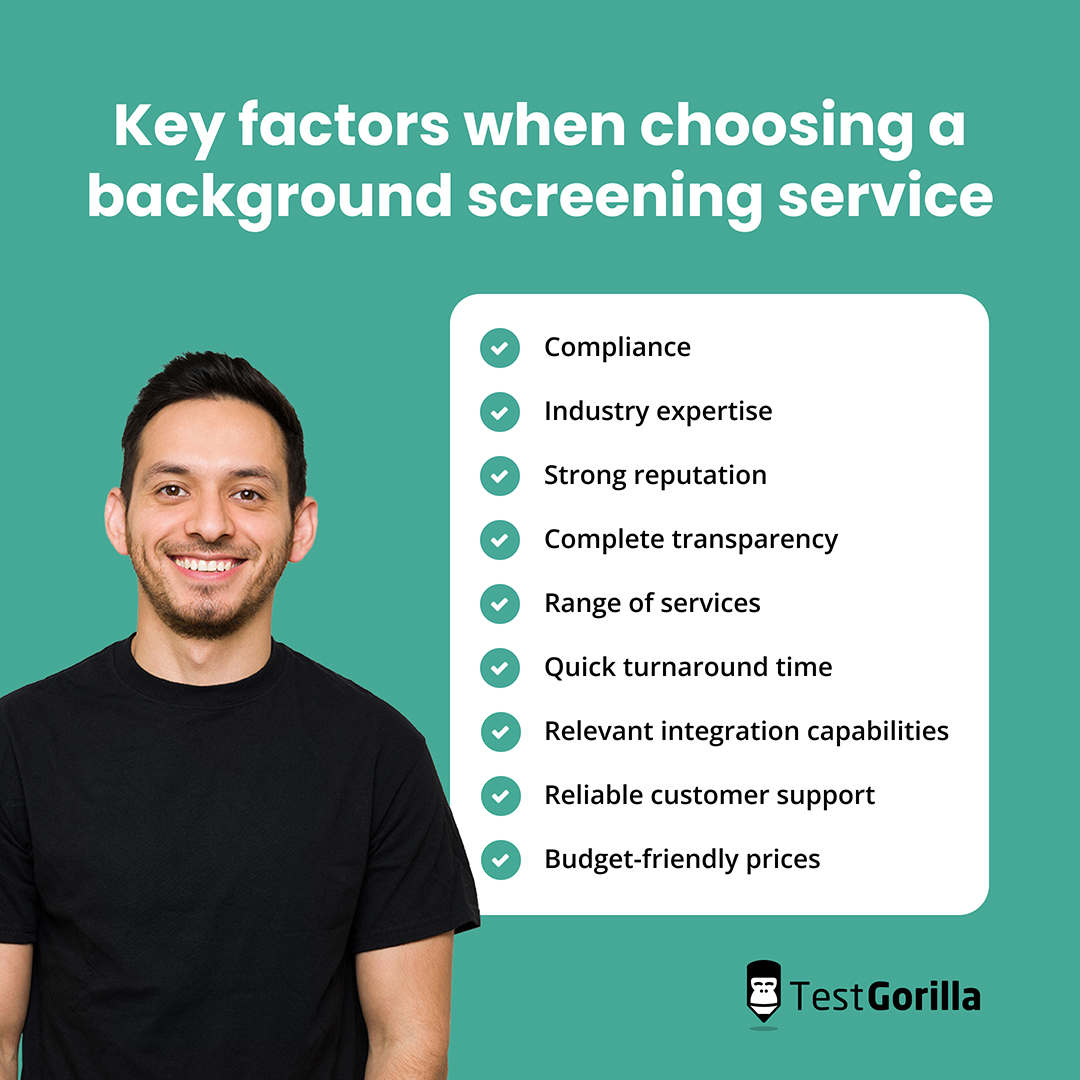Sometimes, you can hire a candidate who seemingly ticks all the right boxes – only to discover that they fibbed about their qualifications and experiences. Or, they had criminal records, financial liabilities, or other problems you weren’t aware of.
Terminating the employee and rehiring for the role can be a painful undertaking. On top of this, their presence could also result in poor-quality work, reputational damage, or an unsafe working environment for team members. That’s why it's essential to thoroughly vet your candidates before hiring them.
The most popular way to do this is through background checks. However, many employers still don’t understand exactly what these are and how to incorporate them into their recruitment best practices.
This guide explains what background checks are, what they comprise, and how to choose the right provider. We also share best practices to minimize failed background checks by strengthening your initial candidate screening process.
Table of contents
- Employee background checks explained?
- What does a background check consist of?
- How does a background check work?
- How long does a background check take?
- Why are pre-employment background checks important?
- What to look for when choosing a background screening service
- How to minimize failed background checks
- Make reliable and trust-worthy hires with TestGorilla
Employee background checks explained?
An employee background check – or background screening – is a process to investigate and verify candidates’ personal and professional histories. It typically includes educational and work experiences, criminal records, and credit history.
Employers usually use a professional background screening provider to conduct the checks using public and private sources. The provider can access records from the past seven years – or more if state law permits.
Background checks aim to properly vet applicants' qualifications, suitability, and trustworthiness. They’re typically conducted after a candidate accepts a job offer but before officially joining the role or company.
What does a background check consist of?
A background check's specific components and depth can vary for employers, industries, and jobs. For instance, childcare workers will likely undergo more rigorous checks than office administrators, given their role requires direct interaction with children.
Some of the most common components of employee background checks are listed below.
Identity verification
Employment verification and reference checks
Education verification
Professional license verification – e.g., a medical license
Criminal history check
Credit history check
Driving record or motor vehicle check
Drug and alcohol testing
Social media screening
Recommended reading: What does a background check show?
The best insights on HR and recruitment, delivered to your inbox.
Biweekly updates. No spam. Unsubscribe any time.
How does a background check work?
There are several legal and compliance considerations when conducting a background check. Here are the key steps you can take when vetting your candidates.
Identify the need for a background check
Determine which positions in your organization require a background check. This will depend on factors such as the nature of the job, access to sensitive information, and industry regulations.
Ensure you’re objective when you decide which employees require background checks and can explain the business need for screening candidates for a particular job. If you’re only conducting background checks for certain groups of employees, it could be construed as discriminatory and illegal by the Equal Employment Opportunity Commission (EEOC).
Obtain consent from your candidates
According to the Fair Credit Reporting Act (FCRA), you must get written consent from your candidates or employees before subjecting them to a background check. You can explain the process and collect consent on a stand-alone document as part of the candidate’s hiring paperwork.
Select a background check provider
You must work with a third-party background check provider to conduct the investigation. These providers specialize in collecting and verifying information. They’re responsible for ensuring accuracy and staying compliant with relevant laws and regulations.
Initiate the background check
You must share the applicant’s name, date of birth, Social Security number, and other relevant information with your third-party provider. In most cases, candidates or current employees must also complete forms to share information with the provider.
The provider will then initiate various checks – such as employment verification and criminal history checks – as required for the role.
Review the results
Once the background check is complete, the provider will compile and share the results with you. You can review these results to assess a candidate’s suitability for the role and identify potential red flags.
Seek legal advice if adverse action is required
If the results of the background check lead to you withdrawing your job offer or terminating a current employee, you must provide the individual with an adverse action notice explaining the reasoning and sharing information about their right to dispute the decision.
Seek legal counsel to ensure you follow the proper protocol and mitigate risks such as non-compliance with fair-chance hiring practices.
How long does a background check take?
The turnaround time for a background check depends on the depth of the search. On average, it should take between two to five business days. Depending on court backlogs, federal holidays, and the candidate’s geographic location, it could take a week or longer.
Why are pre-employment background checks important?
Conducting employee background checks offers several benefits for employers. Some of the key advantages are detailed below.
Helps to mitigate the risk of mis-hiring
Imagine recruiting an individual who lied about their educational background or work experience. They’re likely to hamper productivity and create a frustrating environment for their team members. On top of this, you’ll have to spend time and resources dismissing them and hiring someone else for the role.
You likely would have been able to avoid this if you’d conducted a background check to verify their academic or employment experiences.
Keeps you compliant with laws and regulations
Certain roles – for instance, healthcare, construction, and financial services workers – typically need specific local, state, or federal licenses to do their jobs. Conducting a background check helps ensure your candidates have the required qualifications and licenses, reducing your risk of non-compliance with the law.
Enhances workplace safety
Employee background checks help identify applicants with histories of violence, harassment, or other harmful behaviors. Knowing this information in advance can prevent you from hiring the wrong individual. This way, you can maintain a safe and inclusive work environment for your team.
Protects your company’s reputation
Hiring employees with questionable backgrounds or ethical concerns can risk your company’s reputation. Customers, investors, and other stakeholders are much more likely to trust your company if they know you’ve conducted background checks for each employee.
What to look for when choosing a background screening service
A good background check provider will be cost-effective, thorough, and easy to work with. Look for the key factors below when choosing your employee background screening provider.
Compliance: Ensure the company adheres to legal regulations like the EEOC and FCRA and takes the necessary measures to protect applicants’ data.
Industry expertise: Look for providers with plenty of experience in your field.
Strong reputation: Verify the provider’s track record and check its reviews for reliable information.
Complete transparency: Understand the reporting and verification processes and ask to see sample reports before signing up with a third-party provider.
Range of services: Ensure the provider offers all the necessary checks for the position.
Quick turnaround time: Find a provider that works quickly and efficiently.
Relevant integration capabilities: Use a company that integrates with your applicant tracking system or other recruitment software.
Reliable customer support: Ensure your provider can offer quality customer service and swift resolution of errors or complaints.
Budget-friendly prices: Look for a service that aligns with your budget and provides good value for money, such as an all-inclusive package.
How to minimize failed background checks
Failed background checks mean getting legal counsel involved and starting the hiring process all over again – which is both costly and time-consuming.
Here are some methods to avoid spending your time and money on candidates likely to fail their background checks.
Use pre-employment testing
Pre-employment screening tests are an excellent way to vet and verify your candidates before making them a job offer. You can roll out job-specific skills tests and cognitive ability tests to ensure they have the expertise required for a role.
Personality and culture assessments can also help you identify potential causes for concern regarding candidates’ core traits and characteristics.
In this way, using online tests helps you better your chances of offering the role to the right candidate and reduces the likelihood of poor background check results.
Conduct behavioral interviews
Once you’ve screened your candidates with pre-employment tests, put them through an interview process to further examine their traits and observable attributes before offering them the role.
Interviews don’t necessarily need to be in person or even live. One-way video interviews are cost-effective, let candidates participate conveniently from anywhere, and allow you to evaluate responses carefully and in your own time.
Rely on referrals and references
Candidates who come through employee referral programs are less likely to fail background checks. This is because they’re recommended by your current employees who already know them personally or have worked with them previously.
For candidates who come through external sources, conduct a thorough reference check. The reference could be from their previous employer, college tutors or professors, or someone in their personal life.
Although referrals and references help you feel reassured in your hiring decisions, they’re not 100% reliable. That’s why you should put all your candidates through employee background checks, regardless of how they’re sourced.
Make reliable and trust-worthy hires with TestGorilla
Employee background checks are essential to the hiring process. They help you build and maintain a safe working environment for your workforce, keep you compliant with the law, and protect your company’s reputation with stakeholders.
However, a failed background check can have unwanted repercussions. You’ll have to spend time and money consulting with legal experts when withdrawing a job offer. Further, you’ll need to start hiring for the role again from scratch.
That’s why you should use pre-employment testing to strengthen your initial screening process. This way, you can eliminate questionable candidates before making a job offer and putting them through a background check. The best way to roll out pre-employment tests is through a platform like TestGorilla.
TestGorilla’s extensive test library boasts 300+ tests – including job-specific skills assessments, personality and culture tests, cognitive ability tests, and more. These tests provide a quick and effective way to vet applicants’ skills, identify red flags, and improve your chances of offering the job to a reliable and trustworthy candidate.
Sign up for a free plan, take our product tour, or request a 30-minute live demo to explore how TestGorilla can strengthen your hiring process today.
You've scrolled this far
Why not try TestGorilla for free, and see what happens when you put skills first.
















